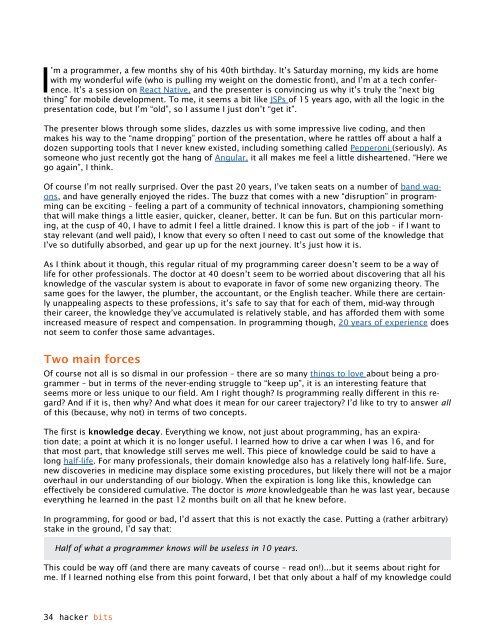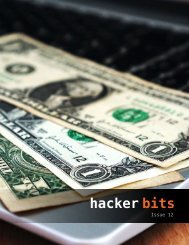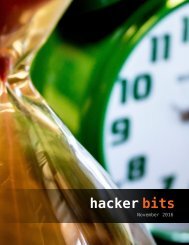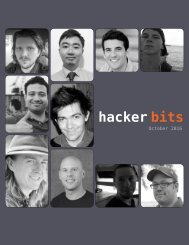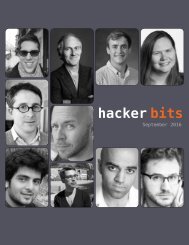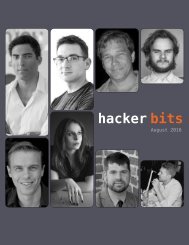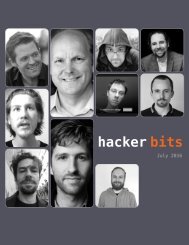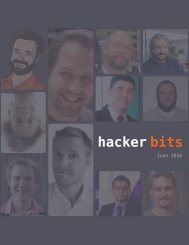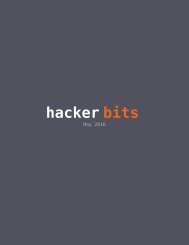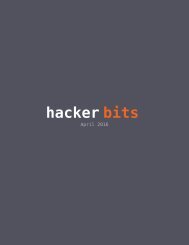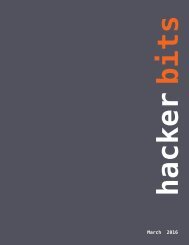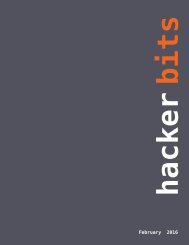Hacker Bits, Issue 11
HACKER BITS is the monthly magazine that gives you the hottest technology stories crowdsourced by the readers of Hacker News. We select from the top voted stories and publish them in an easy-to-read magazine format. Get HACKER BITS delivered to your inbox every month! For more, visit https://hackerbits.com/issue11.
HACKER BITS is the monthly magazine that gives you the hottest technology stories crowdsourced by the readers of Hacker News. We select from the top voted stories and publish them in an easy-to-read magazine format.
Get HACKER BITS delivered to your inbox every month! For more, visit https://hackerbits.com/issue11.
Create successful ePaper yourself
Turn your PDF publications into a flip-book with our unique Google optimized e-Paper software.
I’m a programmer, a few months shy of his 40th birthday. It’s Saturday morning, my kids are home<br />
with my wonderful wife (who is pulling my weight on the domestic front), and I’m at a tech conference.<br />
It’s a session on React Native, and the presenter is convincing us why it’s truly the “next big<br />
thing” for mobile development. To me, it seems a bit like JSPs of 15 years ago, with all the logic in the<br />
presentation code, but I’m “old”, so I assume I just don’t “get it”.<br />
The presenter blows through some slides, dazzles us with some impressive live coding, and then<br />
makes his way to the “name dropping” portion of the presentation, where he rattles off about a half a<br />
dozen supporting tools that I never knew existed, including something called Pepperoni (seriously). As<br />
someone who just recently got the hang of Angular, it all makes me feel a little disheartened. “Here we<br />
go again”, I think.<br />
Of course I’m not really surprised. Over the past 20 years, I’ve taken seats on a number of band wagons,<br />
and have generally enjoyed the rides. The buzz that comes with a new “disruption” in programming<br />
can be exciting – feeling a part of a community of technical innovators, championing something<br />
that will make things a little easier, quicker, cleaner, better. It can be fun. But on this particular morning,<br />
at the cusp of 40, I have to admit I feel a little drained. I know this is part of the job – if I want to<br />
stay relevant (and well paid), I know that every so often I need to cast out some of the knowledge that<br />
I’ve so dutifully absorbed, and gear up up for the next journey. It’s just how it is.<br />
As I think about it though, this regular ritual of my programming career doesn’t seem to be a way of<br />
life for other professionals. The doctor at 40 doesn’t seem to be worried about discovering that all his<br />
knowledge of the vascular system is about to evaporate in favor of some new organizing theory. The<br />
same goes for the lawyer, the plumber, the accountant, or the English teacher. While there are certainly<br />
unappealing aspects to these professions, it’s safe to say that for each of them, mid-way through<br />
their career, the knowledge they’ve accumulated is relatively stable, and has afforded them with some<br />
increased measure of respect and compensation. In programming though, 20 years of experience does<br />
not seem to confer those same advantages.<br />
Two main forces<br />
Of course not all is so dismal in our profession – there are so many things to love about being a programmer<br />
– but in terms of the never-ending struggle to “keep up”, it is an interesting feature that<br />
seems more or less unique to our field. Am I right though? Is programming really different in this regard?<br />
And if it is, then why? And what does it mean for our career trajectory? I’d like to try to answer all<br />
of this (because, why not) in terms of two concepts.<br />
The first is knowledge decay. Everything we know, not just about programming, has an expiration<br />
date; a point at which it is no longer useful. I learned how to drive a car when I was 16, and for<br />
that most part, that knowledge still serves me well. This piece of knowledge could be said to have a<br />
long half-life. For many professionals, their domain knowledge also has a relatively long half-life. Sure,<br />
new discoveries in medicine may displace some existing procedures, but likely there will not be a major<br />
overhaul in our understanding of our biology. When the expiration is long like this, knowledge can<br />
effectively be considered cumulative. The doctor is more knowledgeable than he was last year, because<br />
everything he learned in the past 12 months built on all that he knew before.<br />
In programming, for good or bad, I’d assert that this is not exactly the case. Putting a (rather arbitrary)<br />
stake in the ground, I’d say that:<br />
Half of what a programmer knows will be useless in 10 years.<br />
This could be way off (and there are many caveats of course – read on!)...but it seems about right for<br />
me. If I learned nothing else from this point forward, I bet that only about a half of my knowledge could<br />
34 hacker bits


